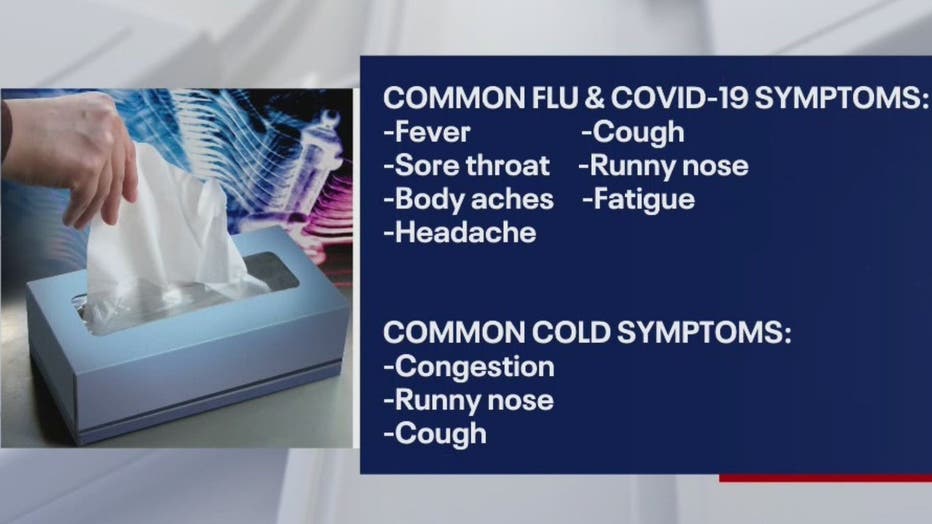Omicron variant: How can I tell if my symptoms are COVID, flu or common cold?

Omicron variant: How can I tell if my symptoms are COVID, flu or common cold?
Doctors admit it's extremely difficult to differentiate between the flu and COVID, but there are subtle differences between omicron and delta variants.
FORT WORTH, Texas (KDFW/KTTV) - With students returning to the classroom and the number of COVID-19 cases soaring, many parents are certain to face a dilemma. Should your child stay home because of a runny nose?
Cook Children’s Medical Center in Fort Worth said it has seen the number of pediatric COVID-19 cases skyrocket over the past week with about 31% of all tests or 600 per day coming back positive.
PREVIOUS COVERAGE: Omicron symptoms: Is that runny nose COVID-19 or a common cold?
Get your top stories delivered daily! Sign up for FOX 11’s Fast 5 newsletter. And, get breaking news alerts in the FOX 11 News app. Download for iOS or Android.
That’s the highest it’s been since the pandemic began, higher than even the surge caused by the delta variant this past September.
Doctors attribute it to the omicron variant being much more transmissible than other variants. And even though the omicron variant is the dominant variant in North Texas right now, the delta variant is still circulating.
HOW CAN I TELL THE DIFFERENCE?
So, what should you do when your child comes home from school with symptoms like a sore throat, runny nose or a cough? How can you tell the difference between COVID-19, a common cold and the flu?
COMMON OMICRON SYMPTOMS*
- Sore throat
- Cough
- Congestion
- Runny nose
- Fatigue
COMMON DELTA VARIANT SYMPTOMS*
- Cough
- Fever
- Headache
- Sometimes: loss of smell or taste
*=Information taken from Cook Children's (Texas) Medical Center)

Since these variants share so many similar symptoms to the common cold and the flu, the hospital said it can be nearly impossible to distinguish between them without a test.
OMICRON VARIANT IN ‘FULL EFFECT’
Dr. Ali Jamehdor, the Medical Director of St. Mary's Emergency Room, said the omicron variant is in "full effect" at his hospital.
"The ER's are definitely seeing a surge of patients coming in for testing. The good news is most of them are not that sick as far as medical wise. I mean obviously they feel bad but the good news is that they're not as sick as the delta wave and the initial wave that we saw, especially the vaccinated patients. They have super mild symptoms. They basically want to know if I have it or not," he said.
Jamehdor said people coming into the ER to be tested is leading to backups.
"I work at several ER's and they're all getting inundated with patients coming in to be tested, asymptomatic, or mild symptomatic and it really does back up the ER," he said.
According to the CDC website, the symptoms for Covid-19 and the flu are very similar, and Dr. Jamehdor said it is very difficult to differentiate.
"Runny nose, sniffles, mild cough, body ache, those are pretty much the symptoms we're seeing in the emergency room with the omicron these days. It seems that most people are having a little bit of higher fevers with omicron than a regular cold but then the flu comes with a little bit of a fever so that can get confused with the flu. Body aches, the runny nose and mild cough all overlap together so it is almost impossible to tell the difference. The fever really kicks it into flu versus omicron and unfortunately to differentiate between those two is pretty tough," said Jamehdor.
WHAT IS ‘FLURONA’?
Jamehdor also broke down what flurona is.
"It's not a new strain or some kind of a new bug. It's just you have the flu and you have corona so they gave it that term, flurona," he said.
He urged the importance of wearing a mask.
"Last year, we saw very few flu cases and that's because everyone was very heavy duty about wearing the mask. People are becoming lax these days so people are catching the flu and people forgot about the flu vaccine," he said.
Jamehdor said if you are symptomatic, and test negative, it's still important to isolate.
"You still need to isolate and quarantine because some of these antigen tests will have a false negative. A lot of people go get tested, and they get tested for omicron and they're negative and they're like OK great let's go party, don't do that. Number one, there's something called flu, and something called RSV. We are seeing more adults with RSV. Just because you don't have omicron, doesn't mean you don't have another virus that you can spread and get someone else sick," he said.
Dr. Anne Rimoin, an epidemiologist for the UCLA Fielding School of Public Health, said the Covid-19 virus will continue to mutate into new variants.
"Every time a virus has an opportunity to spread, it has the opportunity to mutate. When it has the opportunity to mutate, eventually you're gonna see a series of mutations come together that will create a dangerous variant," she said.
Rimoin said the IHU variant found in France is a reminder of the ever-evolving variants.
"This variant that they have discovered in France is not necessarily a variant that we need to be worrying about per se, it's just a reminder that there will be new variants that will come down the pike, and that we need to be doing excellent surveillance. We can't let our guard down," she said.
Koco McAboy, of FOX 11 (Los Angeles), contributed to this report.
Tune in to FOX 11 Los Angeles for the latest Southern California news.

